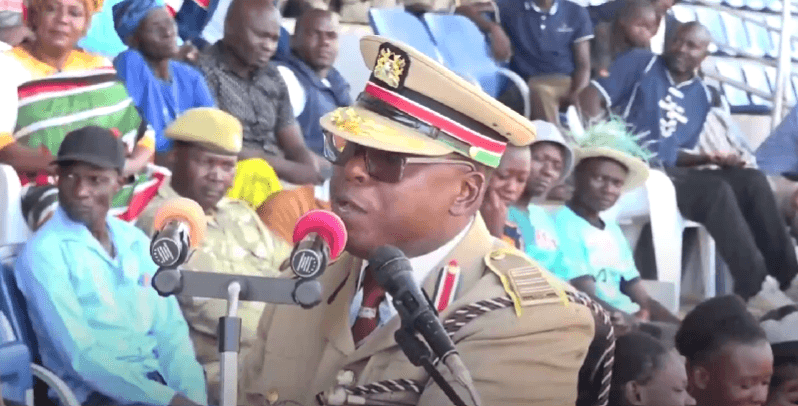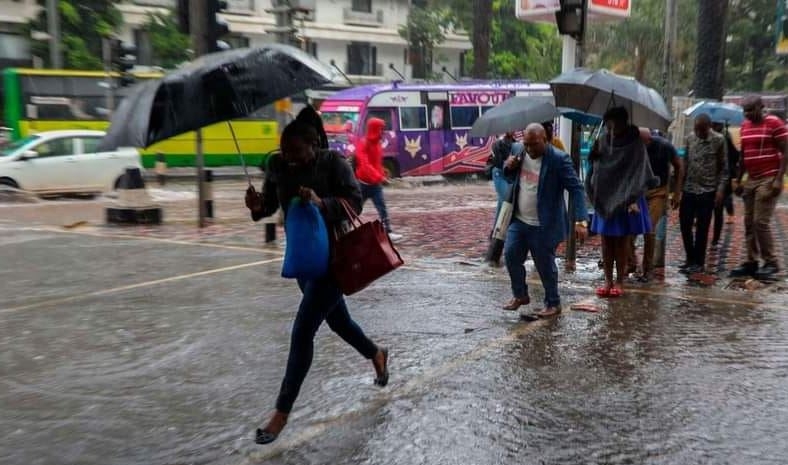On Saturday, February 15, a viral video of Japanese Ambassador Ryoichi Horie went viral, and it was not for the wrong reasons.
Ryoichi had performed the popular 'Malaika' acapella alongside his wife in Elgeyo Marakwet, earning a standing ovation and applause from those present.
It was, however, not the first time he was performing. He and his wife performed in front of President Uhuru Kenyatta during the groundbreaking ceremony of Dongo Kundu Special Zone.
The Star had a chat with the singing Japanese ambassador.
Kindly tell our readers about yourself and your stay has been in Kenya since you started your tour of duty last year.
I have worked in various missions in Europe, North America, Asia, Africa and Oceania, but among all of them, I have the longest relationship with Africa.
My very first overseas posting was in Nigeria, where I worked from 1982-84, and my first ambassadorial posting was in Sudan, where I served from 2012-14. Kenya is the third African country I have been posted to.
I have also held various positions at the Ministry of Foreign Affairs Headquarters in Japan. During my tenure at the African Affairs Department, I had the privilege of visiting 15 African countries, including Kenya. I visited Nairobi on several occasions and my last visit was almost 30 years ago. I am very impressed with the changes and the development the country has undergone since then.
My stay in Kenya has been amazing. I am enjoying the good climate and beautiful golf courses. My wife is a master of the Sogetsu School of Ikebana, the Japanese traditional art of flower arrangement, and she enjoys the rich variety of flowers in this country.
You have been recorded on several occasions performing the popular Kenyan 'Hakuna Matata' song. Would you tell us about your love for music and playing the guitar?
I love singing and playing the guitar with my wife harmonizing vocally. I started music performance in 2018 in Micronesia, where I served as an ambassador. I was impressed by a Japanese acapella group called INSPI, who came as guest singers to mark the 30th diplomatic relationship between Japan and Micronesia.
Their harmony was so attractive that we started singing in front of Micronesian people. To my relief, they loved it. This is how we started our performance.
I enjoy entertaining people with our songs and I’m proud that I remembered two Kiswahili songs, 'Malaika' and 'Jambo Bwana'. I have had the privilege of singing in front of President Kenyatta on several occasions that were broadcast on TV. I think that’s why I’m recognised as “the singing Ambassador”.
I have had the privilege of singing in front of President Kenyatta on several occasions that were broadcast on TV. I think that’s why I’m recognised as 'the singing Ambassador'
Among the projects you are handling is the partnership between Kenya and Japan for the Sh210 billion Likoni Bridge. Kindly explain the financing model and why you decided to partner in this project.
Mombasa has the biggest international port in East Africa and is the entry point to the Northern Corridor that leads to Uganda and Rwanda. It plays a key role as the gateway into the region.
However, Mombasa has been suffering from heavy traffic jams caused by population growth and an increase in vehicles, especially at the Likoni Channel.
Ferries are the main means of transport over the harbour and they cause terrible traffic jams for people waiting to board them at peak commuting time in the morning and evening. In addition, accidents related to the ferries and challenges in safety have been pointed out for a long time now.
In the third Medium-Term Plan, which stipulates an action plan in medium-term for Vision 2030, traffic congestions in urban areas are raised as a challenge that should be tackled in the transport and infrastructure field, and the improvement of the road network is required to activate trade and distribution in the country and the region.
Considering these situations, it is expected that the construction of the Likoni Bridge and the road improvement around the bridge will ease traffic congestion, facilitate the distribution of goods and services and finally revitalise the economy in the country and the region. This is why Japan decided to support this important project.
Regarding the financing model, Japan signed the Exchange of Notes for offering a loan amounting to about Sh48 billion with Kenya to start the initial civil work, but it is not enough for the completion of the project. Japan, therefore, will consider offering additional support to this project based on its progress.
Japan hosted the Ticad 7 summit and in the Yokohama Declaration, your country committed to sustaining and accelerating development, “taking advantage of Africa’s opportunities for transformation”. Elaborate on how you will do this in Kenya.
The government of Japan decides Country Assistance Policy for respective countries. Items set as priorities in the policy for Kenya are the development of infrastructure to support economic growth, agricultural development, environmental preservation, human resource development and health care and medical care. The necessity of these fields is stated in the 2019 Yokohama Declaration.
In addition, these fields are aligned with Kenya’s Big Four agenda. Japan, therefore, wishes to offer the Official Development Assistance to Kenya in these fields through consultation, while respecting its ownership.
Under “Development of Infrastructure to Support Economic Growth”, Japan wishes to proceed undoubtedly with the Dongo Kundu SEZ project and Mombasa Gate Bridge (Likoni Bridge) project to strengthen the foundation of Mombasa as the gateway into the region and to make Mombasa develop as a hub for industry and manufacturing. Furthermore, Japan desires to continue to support the energy sector, in areas such as geothermal power, which Japan has been supporting for a long time.
Under “Agricultural Development”, we plan to certainly complete the irrigation dam in Mwea to strengthen agriculture infrastructure, and to improve production and incomes of small horticulture farmers through technical cooperation.
Under “Environmental Preservation”, Japan wishes to support countermeasures for climate change from adaptation and mitigation aspects, such as water resource management and forest preservation, and also wishes to support the strengthening of waste management in collaboration with Africa Clean City Platform.
Under “Human Resource Development”, Japan will continue to offer a variety of scholarship programmes and training courses, such as ABE Initiative, therefore contributing to human resource development in the industrial field.
Finally, under the priority, “Health Care and Medical Care”, Japan wishes to support the achievement of UHC in terms of finance, and capacity development for human resources in the counties, which is the backbone of the health sector.
The seventh Tokyo International Conference on African Development (Ticad 7) was held in Japan in August 2019. On Tuesday, March 17, we will have Ticad 7 follow-up seminar to look back, and focus on the human resource development needs of the manufacturing industry, and review the association with the Big Four agenda.
The Yokohama Declaration reiterated that the reform of the Security Council should be addressed in a comprehensive, transparent and balanced manner. Do Japan and Africa have a working framework in pushing for reforms at the UNSC?
Yes, Japan and Africa can work together to push reforms at the UNSC. Japan supports the African common position to be adequately reflected. Japan also supports Africa’s representation in both the permanent and non-permanent membership of the Security Council. We should express a strong message for reform together to enhance the Council’s representativeness, safeguard its legitimacy, and increase support for reform broadly.
Japan will host the Summer Olympics in August. Last year, you also hosted the Rugby World Cup. Nairobi and Tokyo have had a history in sports development, especially athletics and judo. How do you think the two countries can build on this to enhance people-to-people relations?
I’m very pleased to announce that Kenya's Ministry of Sports, Culture and Heritage, the National Olympic Committee of Kenya, Kurume City and Fukuoka Prefecture signed the “Written Confirmation concerning the Pre-Games Training Camps for the Kenyan Olympic Team for the Olympic and Paralympic Games Tokyo 2020”.
It is our duty to make the most of this great opportunity to nurture and enhance people-to-people relations. I’m convinced that Kenyan athletes will bring out their full potential in this supportive environment.
Furthermore, I’d like to encourage you to pay attention to the Kenyan female volleyball team, whose coach is Japanese, Mr Katagiri, dispatched by Jica (Japan International Cooperation Agency). Also, Kenya and Japan have had a long history of friendship in sports and it is symbolised by the qualification of the team to the Olympics.
Last year, the Embassy of Japan, in collaboration with the Kenya Judo Association, held the Second Judo Japanese Ambassadors Cup at the Nairobi Japanese School. I was very happy to see many Kenyans love this Japanese martial art and hope to have this kind of opportunity again.
Edited by T Jalio












